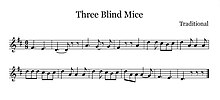Three Blind Mice
| "Three Blind Mice" | |
|---|---|

Sheet music
|
|
| Nursery rhyme | |
| Published | c. 1805 |
"Three Blind Mice" is an English-language nursery rhyme and musical round. It has a Roud Folk Song Index number of 3753.
The modern words are:
Published by Frederick Warne & Co., an illustrated children's book by John W. Ivimey entitled The Complete Version of Ye Three Blind Mice, fleshes the mice out into mischievous characters who seek adventure, eventually being taken in by a farmer whose wife chases them from the house and into a bramble bush, which blinds them. Soon after, their tails are removed by "the butcher's wife" when the complete version incorporates the original verse -- although, as noted below, the earliest version from 1609 doesn't mention tails being cut off. The story ends with them using a tonic to grow new tails and recover their eyesight, learning a trade (making wood chips, according to the accompanying illustration), buying a house and living happily ever after. Published perhaps in 1900, the book is now in the public domain.
A version of this rhyme, together with music, was published in Deuteromelia or The Seconde part of Musicks melodie (1609). The editor of the book, and possible author of the rhyme, was Thomas Ravenscroft, who in 1609 was still a teenager. The original lyrics are:
Attempts to read historical significance into the words have led to the speculation that this musical round was written earlier and refers to Queen Mary I of England blinding and executing three Protestant bishops, but problematically the Oxford Martyrs, Ridley, Latimer and Cranmer, were burned at the stake, not blinded; although if the rhyme was made by crypto-Catholics, the mice's "blindness" could refer to their Protestantism. However, as can be seen above, the earliest lyrics don't talk about harming the three blind mice, and the first known date of publication is 1609, well after Queen Mary died.
The rhyme only entered children's literature in 1842 when it was published in a collection by James Orchard Halliwell.
Amateur music composer Thomas Oliphant (1799–1873) noted in 1843 that:
...
Wikipedia
